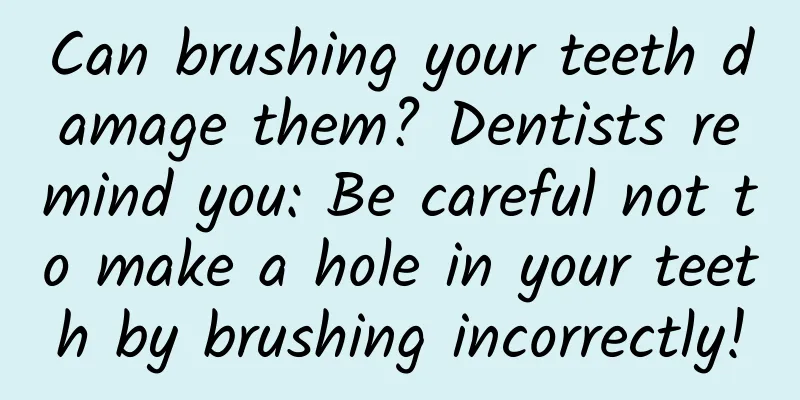Can brushing your teeth damage them? Dentists remind you: Be careful not to make a hole in your teeth by brushing incorrectly!

|
When talking about brushing teeth, many people will confidently say: "I brush my teeth three times a day, and I brush my teeth very hard every time, but I'm just afraid that I can't brush them clean." Little do they know that if the brushing method is improper and too hard is used, the teeth can really be "damaged". Recently, the Department of Stomatology of Hunan Provincial Second People's Hospital (Provincial Brain Hospital) received a patient named Luo who said that "all his teeth are sensitive and he dares not eat anything". After examination, it was found that Mr. Luo had a "wedge-shaped defect" at the neck of all his teeth due to his incorrect brushing method, which caused dentin sensitivity. Mr. Luo then underwent resin filling surgery on the defective tooth at the Department of Stomatology of Hunan Provincial Second People's Hospital (Provincial Brain Hospital) . Mr. Luo usually takes brushing his teeth very seriously, saying, "I brush my teeth at least three times a day, and very vigorously." However, due to incorrect brushing, he eventually suffered a "wedge-shaped defect" in his teeth. Let's learn how Mr. Luo "damaged" his teeth step by step. 1. What is a wedge-shaped defect?It is a defect formed by the slow consumption of the neck of the tooth, in the shape of a "V". Because it looks like a wedge used by carpenters, it is called a "wedge-shaped defect". The interior of a natural tooth contains pulp tissue, which contains blood vessels and nerves that extend to the dentinal tubules and are responsible for the nutrition of the tooth and the function of sensation. When a wedge-shaped defect is formed, the dentinal tubules at the neck of the tooth are directly exposed to the outside world, which can easily cause the most common early symptom - food sensitivity. When eating slightly cool or hot food, the affected tooth is prone to transient sensitivity, which is commonly known as the "shudder" feeling. If we do not pay enough attention to it and take some measures to improve it, it will cause caries and even toothache, that is, inflammation of the dental nerve. In more serious cases, it may cause the crown at the neck level of the tooth to break, leaving only the residual root in the mouth, which affects the appearance and also brings challenges to the later restoration. 2. Causes of wedge-shaped defect1. Incorrect brushing method Long-term horizontal brushing or using a hard toothbrush or brushing too hard will cause wear on the neck of the teeth. Clinically, wedge-shaped defects in the neck of the teeth are more likely to be located at the third and fourth teeth behind the central teeth of the upper and lower jaws, respectively. These teeth are at the corners of the dentition, so they are subject to the greatest force when brushing. 2. Weak tooth neck tissue Teeth also have weak spots, namely the neck of the tooth. This area has the least enamel coverage, so the gums are prone to inflammation or atrophy, causing the tooth to be exposed, so it has the worst wear resistance. 3. Extrusion When brushing your teeth, the cheek muscles squeeze the toothbrush, which makes the friction between the toothbrush and the teeth greater, aggravating the wear of the protruding part of the tooth neck caused by horizontal brushing. 4. Effect of Acid The acid in the gingival sulcus fluid is related to wedge-shaped defects, which explains why the defect occurs at the root of the gingival margin. Patients with gastritis and those who often have acid reflux are also prone to wedge-shaped defects in their teeth. 5. Bacterial Effects Some people believe that acid-producing bacteria form a large amount of acid in the plaque on the cervical area of the teeth, leading to tooth demineralization. The reduced strength of the tooth tissue is prone to wedge-shaped defects under the action of external forces. 3. How to treat wedge-shaped defect?Wedge-shaped defects are not a very complicated problem. As long as they are treated promptly and symptomatically, the pain or suffering of tooth loss can be reduced. For those with shallow tissue defects and no pain symptoms, no special local treatment is required, but brushing the teeth horizontally should be avoided, and a softer toothbrush and toothpaste with finer fillers should be used. For teeth with shallow tissue defects but sensitive teeth, desensitizing toothpaste can be used, or drugs can be used clinically for desensitization. When the defect is large and deep, composite resins or glass ionomer cements that are similar in color to the teeth and have a certain degree of adhesion can be used to fill the wedge-shaped defect to prevent further development. For teeth that have pulp perforation, pulp symptoms, or apical periodontitis, endodontic treatment should be performed promptly and appropriate restorative methods should be used to restore tooth function. 4. Can wedge-shaped defects be prevented?First, change the wrong way of brushing teeth, avoid brushing horizontally, brushing vigorously, choosing a toothbrush with hard bristles, and avoid using toothpaste with rough abrasives; you should use the modified Bass brushing method or brushing in a circular motion. Secondly, do not eat anything too hard and avoid strong biting force, such as nut shells, crab shells, bones, broad beans and other hard foods; for patients with malocclusion or nocturnal bruxism, they should seek medical attention in time to change their bad biting habits. Also, drink less carbonated drinks to avoid demineralization of enamel on the labial and cheek surfaces, otherwise this will facilitate the formation of tooth defects. In short, maintaining oral health requires comprehensive and long-term persistence. In addition to developing good oral hygiene habits and avoiding chewing hard objects, you should also have regular oral examinations every year to achieve early detection, early prevention, and early treatment.
(Edited by YT) |
<<: Walking like this consumes 20% to 60% more energy!
Recommend
Is it better to see a traditional Chinese doctor or a Western doctor for irregular menstruation?
Irregular menstruation has a huge impact on women...
Can I still eat sweet potato leaves when I’m pregnant?
Pregnant women should not eat anything randomly a...
What is the best test for urinary tract infection in women?
Women's reproductive health is a factor that ...
[Northern Xinjiang Science Popularization] What to do if your eyes itch in spring?
In addition to the common dry eye problem, spring...
Why do I have a lot of blood clots during my period?
It is normal for women to have blood clots during...
How to convince parents to cancel New Year's Eve dinner when the stubborn elders refuse to wear masks
The new type of pneumonia infection is getting mo...
What are the benefits of washing your lower body with white vinegar?
White vinegar is used in many places because it i...
Causes of fever in late pregnancy
The condition of dryness and heat in the late pre...
Can I eat yam when I'm pregnant?
Have you ever heard of the lotus? It is a natural...
A woman with one foot hot and one foot cold
Diabetes is basically well-known, but few people ...
Six months pregnant vaginal pain
When a woman is pregnant, her body will be abnorm...
What are the advantages and disadvantages of drinking soy milk? How to make red bean milk tea
Red bean milk tea is a delicacy, the main ingredi...
Don't ignore abdominal distension and pain, it may be a teratoma
Ovarian teratoma is a relatively common disease a...
Want to have a baby after vasectomy
Some female friends want to have children after h...









